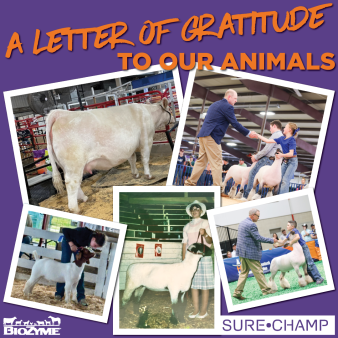
Off Feed
Many people change their eating habits with the seasons. A steaming bowl of soup is satisfying on a cold winter day, but that doesn’t sound appetizing when the heat index reaches 90 degrees or hotter. Your show livestock are no different, but whereas we just change what we eat, they go off feed. Their appetites tend to decrease as the temperatures rise, and that can leave you scrambling to preserve your hard work with that project in the warmer months.
Chris Cassady, Ph.D., BioZyme® Director of Beef Technical Sales, explains 4 reasons why show animals go off feed. He also provides some tips to keep your animal’s appetite in check and ensure they continue to perform.
Why Show Animals Go Off Feed
Seasonal Changes
One of the primary reasons animals stop eating during the summer months is due to seasonal changes. The combination of extended sunlight and the warmer temperatures can alter the animal’s desire to eat.
Other seasonal impacts, like flies and insects, can cause your animals to go off feed. Flies buzzing around an animal’s head and similar pests can be distracting at feeding time.
Increased Temperatures
Animals are typically less active as the temperatures increase, which requires less overall energy, causing them to go off feed. Animals that expend less energy will have a decreased appetite since they don’t require the same amount of nutrients as they would if they were actively using energy.
“Think about this. When we are hot, the last thing we want to do is eat a big meal. That has a lot to do with temperature triggers,” Cassady said. “The temperature alters stress hormones in the animal and has an impact on metabolism and their overall appetite.”
Environmental Changes
During show season, we haul our livestock to jackpots, progress shows, state previews, junior nationals, county fairs and state fairs. Sometimes these are weekly occurrences, and the hauling adds stress to the animal. Loading on the trailer and traveling 20 minutes to 20 hours takes its toll. Then, we stall or pen the livestock in unfamiliar barns with new animals, sights, smells, and sounds, and expect them to eat exactly what we put in their feed pan. This is stressful and will cause the animal to go off feed.
Diet Shifts
Show animal diets are not a one-size-fits-all, and feeding is a science that takes precise calculation in the nutrition needed to meet a specific weight by the target endpoint. If you are making dietary changes, Cassady reminds you to transition gradually. If abrupt changes are made and the animal goes off feed, it will take just as long to get it back on feed as it would to make a gradual transition.
Don’t Let Your Project Go Off Feed
No one has time for show animals that go off feed, so take a proactive approach to keep your livestock eating. Animals are very routine-oriented, so set a feeding schedule and stick to it.
Give Them Amaferm
One of the best ways to make sure your livestock keep eating is to keep the digestive tract healthy. The best way to do that is to include AO-Biotics® Amaferm® in your animals’ diets. Amaferm®️ is a research-proven prebiotic designed to enhance digestibility by amplifying the nutrient supply for maximum performance. Sure Champ® products contain Amaferm to help keep your animals healthy and eating.
Specific products that contain Amaferm that are designed to help drive your animals’ appetite during heat stress situations include Sure Champ Extreme with Climate Control and Sure Champ Climate Control Gel. The Amaferm helps increase intake and digestibility, driving consumption. With the increased efficiency in digestibility, the animal is using less energy to digest food, creating less internal heat. The Climate Control products also contain a plant extract specifically designed to maintain circulation and promote water intake, therefore maintaining the body’s core temperature. They also contain garlic, to deter insects.
“Being aware of the factors that contribute to animals going off feed and including Amaferm can pay big dividends in the show ring,” Cassady said.
Be Consistent
Though we can’t control the seasons, length of day, or the temperatures, we can do our best to be consistent. Feed your animals at a consistent time each day, both morning and night. And, if that means feeding them in a darkened, cool barn with fans, then—if resources allow—we encourage it. Keeping your animals cool is important to maintaining their appetite throughout the summer.
The same goes for when you are traveling. Maintain a normal schedule as much as possible. Keep their feeding times consistent and keep their feed pans the same as they are at home. If they are accustomed to drinking from a tank or another water source other than a bucket, start bucket-watering them before going to the show, as water intake is vital to good health. Water intake is also highly correlated to feed intake.
When you do make feed changes, make them gradually. Yes, feed can change the appearance of an animal over time, but drastic changes too quickly can also lead to decreased appetites that can be detrimental to your feeding program.
Control Flies
Be sure to use a fly spray around your barn and on your animals to keep them comfortable and to keep them eating.
Management and nutrition are the keys to keeping our show animals from going off feed.
Get your Sure Champ Today
Thousands of exhibitors trust Sure Champ products to help prevent their show animals from going off feed. Discover the benefits of including Sure Champ in your show barn, today! Sure Champ has been research-proven to help animals from going off feed for 40 years! From pellets for daily use, to liquids and gels for rapid stress response, Sure Champ has a solution for you.
You can get your Sure Champ products as easily as ordering online today.
Do you prefer to support a local Sure Champ dealer? Find a dealer near you to find all your favorite Sure Champ and other BioZyme products.
Want to stay current on all of our educational blogs and news? Sign up for our newsletter.

